|
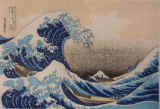 Aug 25-30, 1999 Tokyo, Japan Part II Aug 25-30, 1999 Tokyo, Japan Part IIWe
find ourselves back in Tokyo after spending the last two weeks in a handful of other
cities and towns throughout the country. And, after a few opportunities to 'toss a few
back' with some folks in Kyoto, Osaka, and Tokushima, we're now much more comfortable with
the people of Japan overall, and specifically, those who live here. Now back in town
with our newly 'loosened up' attitude, the city seems a different, more relaxed, and
friendlier place.
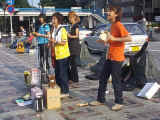 Case
in point - just this morning, no sooner had I pulled a map out to check our bearings, than
a passing businessman stops and does his best to help us (we didn't actually need any
directions, but it's the gesture that counts). Heck, even the vending machines talk to us
as we pass by. Admittedly, it was a bit of a surprise the first time this happened, but
now we break out in laughter each time that one of them calls out to us in its funny
little digitized Japanese voice. Case
in point - just this morning, no sooner had I pulled a map out to check our bearings, than
a passing businessman stops and does his best to help us (we didn't actually need any
directions, but it's the gesture that counts). Heck, even the vending machines talk to us
as we pass by. Admittedly, it was a bit of a surprise the first time this happened, but
now we break out in laughter each time that one of them calls out to us in its funny
little digitized Japanese voice.
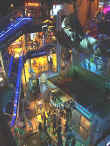 We're
now surrounded with those funny digitized voices. And they're coming from everywhere. This
morning, we've decided to apply the age old creed of 'when in Rome, do as the Romans do',
and join in the local style of fun. And there's no mistaking it, the Japanese style of fun
is digital and virtual. And the epitome of this style of Japanese fun is Joypolis, the
indoor amusement park by the leader in digitized reality games, Sega. Our first ride is
'Treasure Panic', sort of a big screen shoot-em up video game mixed with a tame roller
coaster. From there, we're off to 'Horror Ride'; 'The Crypt', a wicked cool 360 degree 3D
tour; 'Lost World', with its in-your-face dinosaurs and digital tranualizer guns; 'Power
Sled' and 'Boat Race'. We're
now surrounded with those funny digitized voices. And they're coming from everywhere. This
morning, we've decided to apply the age old creed of 'when in Rome, do as the Romans do',
and join in the local style of fun. And there's no mistaking it, the Japanese style of fun
is digital and virtual. And the epitome of this style of Japanese fun is Joypolis, the
indoor amusement park by the leader in digitized reality games, Sega. Our first ride is
'Treasure Panic', sort of a big screen shoot-em up video game mixed with a tame roller
coaster. From there, we're off to 'Horror Ride'; 'The Crypt', a wicked cool 360 degree 3D
tour; 'Lost World', with its in-your-face dinosaurs and digital tranualizer guns; 'Power
Sled' and 'Boat Race'.
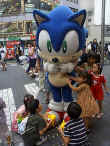 And then to 'Halfpipe Canyon'; 'Rail
Chase'; 'Aqua Nova'; 'Sky Chaser', a virtual hang glider race; and finally VR 2002, an
upside-down, spin-you-around, hammer you with G-forces, twist and turn 3D roller coaster
that's gotta be one of the wildest virtual rides ever invented. Almost seven hours later,
with heads still spinning and stomachs still queasy, we board the subway back to Central
Tokyo to grab some dinner. We're bumped, pushed and knocked around a little by the crowd
of people squeezing into the cars. Oddly, it's not irritating or aggravating, but rather
amusing and comforting, to have the feeling for the first time in Japan, like we're just
two of the crowd. And then to 'Halfpipe Canyon'; 'Rail
Chase'; 'Aqua Nova'; 'Sky Chaser', a virtual hang glider race; and finally VR 2002, an
upside-down, spin-you-around, hammer you with G-forces, twist and turn 3D roller coaster
that's gotta be one of the wildest virtual rides ever invented. Almost seven hours later,
with heads still spinning and stomachs still queasy, we board the subway back to Central
Tokyo to grab some dinner. We're bumped, pushed and knocked around a little by the crowd
of people squeezing into the cars. Oddly, it's not irritating or aggravating, but rather
amusing and comforting, to have the feeling for the first time in Japan, like we're just
two of the crowd.
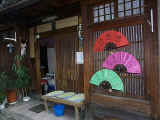 "Irasshiamase!" "Irasshiamase!" they each sing
at us as we walk under the noren of their yakitori restaurant. Ahh, yet another Japanese
practice that we now also find rather amusing and comforting - screaming at new guests as
the walk in the door. In fact, 'irasshiamase' sorta has a nice ring to it, now that we
know that it means 'welcome', and not 'go away, you goofy white people'. Not that they'd
ever say that. Not to our faces anyway. Nope, quite the contrary. The Japanese are, as
we've discovered the past few weeks, exceptionally nice and polite people. While for some
skeptics, their level of sincerity may sometimes come into question, there's absolutely no
question regarding at least their visible (and audible) effort to welcome new guests,
familiar or not. And one other thing's for sure, the restaurant staff get plenty of
chances to practice their 'irasshiamase', since dining out is one of Tokyo's most popular
pastimes. "Irasshiamase!" "Irasshiamase!" they each sing
at us as we walk under the noren of their yakitori restaurant. Ahh, yet another Japanese
practice that we now also find rather amusing and comforting - screaming at new guests as
the walk in the door. In fact, 'irasshiamase' sorta has a nice ring to it, now that we
know that it means 'welcome', and not 'go away, you goofy white people'. Not that they'd
ever say that. Not to our faces anyway. Nope, quite the contrary. The Japanese are, as
we've discovered the past few weeks, exceptionally nice and polite people. While for some
skeptics, their level of sincerity may sometimes come into question, there's absolutely no
question regarding at least their visible (and audible) effort to welcome new guests,
familiar or not. And one other thing's for sure, the restaurant staff get plenty of
chances to practice their 'irasshiamase', since dining out is one of Tokyo's most popular
pastimes.
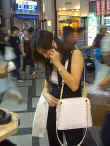 Another recreational favorite of the
Japanese is shopping. And, as evidenced by a stroll down Shinjuku-dori in Shinjuku or
Harumi-dori in Ginza, or by visiting one of the two or three of the world's biggest
department stores that make their home right here, Tokyo is just the place to pursue that
spend, spend, spend pastime. It's so popular that the Japanese have invented their own
slang word for those who do it. 'Chanelah' is used to describe those who pursue browsing
and buying (especially for Channel goods) with an especially reverent passion. Prefer
shopping from stores, or from machines? To the Japanese it makes no difference. Actually,
they may prefer the machines. In fact, it can be said that the folks here are absolutely
in love with their vending machines. Always one, and sometimes as many as twelve or
fifteen, can be found on the corners of most intersections, walking paths, and hotel
lobbies. Estimates put the number of these machines, selling everything from beer, to
wrist watches, to adult videos, at around one for every twenty-five people living in
Japan. Another recreational favorite of the
Japanese is shopping. And, as evidenced by a stroll down Shinjuku-dori in Shinjuku or
Harumi-dori in Ginza, or by visiting one of the two or three of the world's biggest
department stores that make their home right here, Tokyo is just the place to pursue that
spend, spend, spend pastime. It's so popular that the Japanese have invented their own
slang word for those who do it. 'Chanelah' is used to describe those who pursue browsing
and buying (especially for Channel goods) with an especially reverent passion. Prefer
shopping from stores, or from machines? To the Japanese it makes no difference. Actually,
they may prefer the machines. In fact, it can be said that the folks here are absolutely
in love with their vending machines. Always one, and sometimes as many as twelve or
fifteen, can be found on the corners of most intersections, walking paths, and hotel
lobbies. Estimates put the number of these machines, selling everything from beer, to
wrist watches, to adult videos, at around one for every twenty-five people living in
Japan.
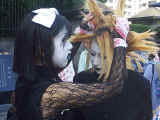 But
right now, we're just hoping for a cold bottle of water out of one of these fancy
do-it-yourself cabinets of commerce. Man, it's hot! And humid! I don't see how the
musicians are able to stand it. They look like they're getting quite a workout strumming,
pounding, and singing their hearts out. We're in the Harajuku area, specifically
Yoyogi-koen Park, strolling around a taking in a sampling of the younger Tokyoans form of
recreation - playing and listening to music. All kinds of music, from rap to rock to blues
the reggae. But
right now, we're just hoping for a cold bottle of water out of one of these fancy
do-it-yourself cabinets of commerce. Man, it's hot! And humid! I don't see how the
musicians are able to stand it. They look like they're getting quite a workout strumming,
pounding, and singing their hearts out. We're in the Harajuku area, specifically
Yoyogi-koen Park, strolling around a taking in a sampling of the younger Tokyoans form of
recreation - playing and listening to music. All kinds of music, from rap to rock to blues
the reggae.
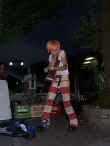 The regular Sunday afternoon jam session
draws not only 20-30 bands (with widely varying degrees of talent) and 2-3 dancing
troupes, but also the regular parade of faithful and colorful fans. As we look around and
'check out the scene, we spot a group to our left dressed in all black leather, sporting
pompadours and dancing to American oldies. The group across the street whose singer is
doing his best to mimic Muddy Waters competes for an audience with the four girls down the
walk who're doing a respectable job of imitating the sophisticated choreography of Janet
Jackson. But it's the two young ladies in kimonos, singing along with a pink
bleached-haired guitarist wearing American flag jeans, that really makes me thankful that
we came back to spend some more time in Tokyo - that we came back to experience its 'other
side'. The regular Sunday afternoon jam session
draws not only 20-30 bands (with widely varying degrees of talent) and 2-3 dancing
troupes, but also the regular parade of faithful and colorful fans. As we look around and
'check out the scene, we spot a group to our left dressed in all black leather, sporting
pompadours and dancing to American oldies. The group across the street whose singer is
doing his best to mimic Muddy Waters competes for an audience with the four girls down the
walk who're doing a respectable job of imitating the sophisticated choreography of Janet
Jackson. But it's the two young ladies in kimonos, singing along with a pink
bleached-haired guitarist wearing American flag jeans, that really makes me thankful that
we came back to spend some more time in Tokyo - that we came back to experience its 'other
side'.
|



